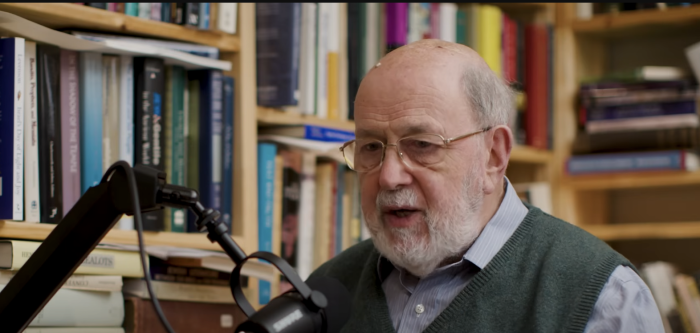
Renowned theologian and New Testament scholar N.T. Wright recently contended that in the new creation, marriage as humans know it won’t exist — yet relationships and desires will be radically transformed in eternity.
In a recent episode of the podcast “Ask N.T. Wright Anything,” Wright responded to a listener who asked whether it would feel “awkward” to remarry after the death of a spouse, considering the Christian hope of reunion in the new Heavens and new Earth.
“Will our relationship be much different than it is now?” the listener asked. “If yes, then how? If no, then wouldn’t remarriage be awkward?”
Wright began by pointing listeners to the well-known Gospel passage in Matthew 22:23–33, where Jesus responds to a question from the Sadducees about resurrection and marriage.
“Jesus says, you got it wrong. That’s not what the new creation is like,” Wright said. “In the new creation, they’re neither married nor are given in marriage.”
Wright emphasized that Jesus’ teaching reveals something fundamental about the nature of the resurrected life. In the new creation, Wright explained, humans will have moved “beyond death itself,” rendering reproduction and thus the institution of marriage, as it is understood, obsolete.
“It is quite possible to imagine that there will be no equivalent in the new creation of sexual activities, such as we know it in the present creation, because the desire to propagate is partly because … sex is a way of saying, despite death, we are in favor of life,” Wright said, citing Sigmund Freud.
“But when God has already given people the full New Life, which is out the other side of death, which is now immortal, there will be no need for propagation.”
Wright illustrated this further with a metaphor borrowed from C.S. Lewis. Lewis once likened questions about whether there will be sex in Heaven to a child wondering whether the greatest adult pleasure, sex, might also involve eating chocolate.
“To which the answer is, well, it might be, but that’s not actually essential,” Wright said. “So I think the sense [is] that in the new creation, so many things will be radically different … our wants will flow from creative self-giving love completely and purely.”
He also noted the evolution of the human experience of marriage itself. In biblical times and much of human history, life expectancy was short and death was common in early adulthood. As a result, remarriage after the death of a spouse was far more frequent and widely accepted than it might be today.
“The marriage vows say, ‘till death do us part.’ They don’t say, ‘but of course I will still be spiritually married to you forever and ever,’” Wright said.
That, he added, doesn’t mean the emotional or spiritual bond with a deceased spouse vanishes.
“There are some widows and widowers who really do still feel that they are absolutely bonded with this dear person that they’ve loved and lost forever,” he acknowledged. “And some people don’t get remarried for that reason … because they just think nothing could ever take this person’s place.”
Wright shared the story of a friend whose first wife died after battling Parkinson’s and Alzheimer’s. Despite his grief, the man eventually remarried, much to his own and others’ surprise. Wright said the experience illustrated that even profound love can be followed by new joy.
“We didn’t all say, ‘Oh, but you’re still spiritually married to that first wife,’” Wright said. “It was a sense of, Wow, this is a whole new thing, and we still give thanks to God for that old relationship, but we celebrate this new one.”
Returning to the listener’s concern, Wright dismissed the idea that a reunion in Heaven with both spouses would be “awkward.”
“Whatever the new creation is going to be like … I don’t think there’s any question that that will be, in the words of our correspondent, awkward,” Wright said. “I think the new creation will be a time of celebration at all sorts of levels … and that awkwardness just doesn’t seem to occur.”
Ultimately, Wright urged listeners to trust in the radical, love-infused transformation that resurrection life promises, a transformation he said reshapes not only individual desires but even the very fabric of relationships.
“Insofar as we want anything at all, we will want different things,” he said. “And our wants will flow from creative self-giving love … rather than the kind of mixed impulses which lead to propagation in the present time.”
Famed evangelist Billy Graham previously weighed in on the same topic, stressing that while earthly marriage won’t exist in Heaven, it will be replaced by a far deeper and eternal relationship: unity with Christ.
“While we cannot fathom not knowing our spouses or children in the earthly sense, Jesus tells us not to worry about these things,” he said. “‘A time is coming when I will no longer use this kind of language. … I have told you these things, so that in me you may have peace. … Take heart! I have overcome the world’ (John 16:25, 33). Marriage as we know it in its human form will not be practiced in Heaven because it will be perfected in the Lord Jesus Christ.
Although our human minds cannot fully understand heavenly things, the day is coming when we will comprehend all great truths, including this one.”
Leah M. Klett is a reporter for The Christian Post. She can be reached at: leah.klett@christianpost.com


















